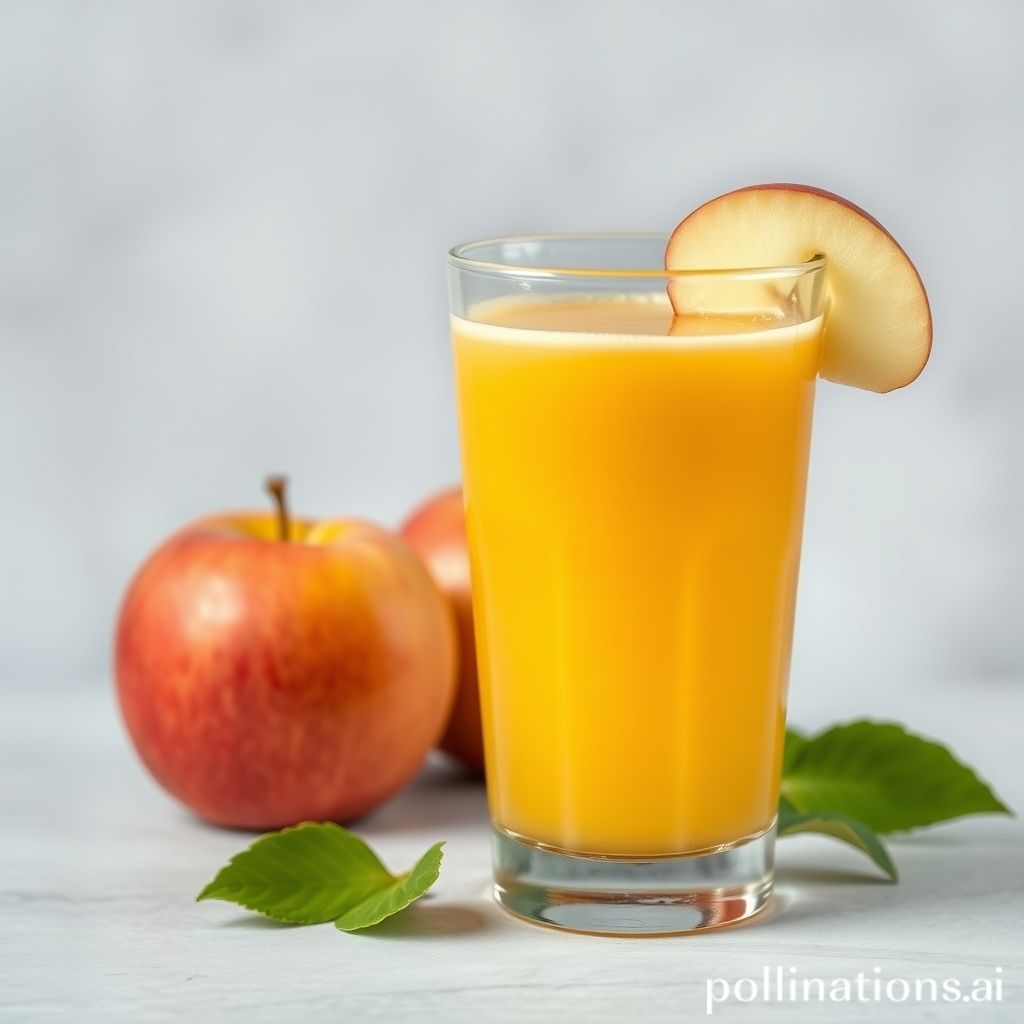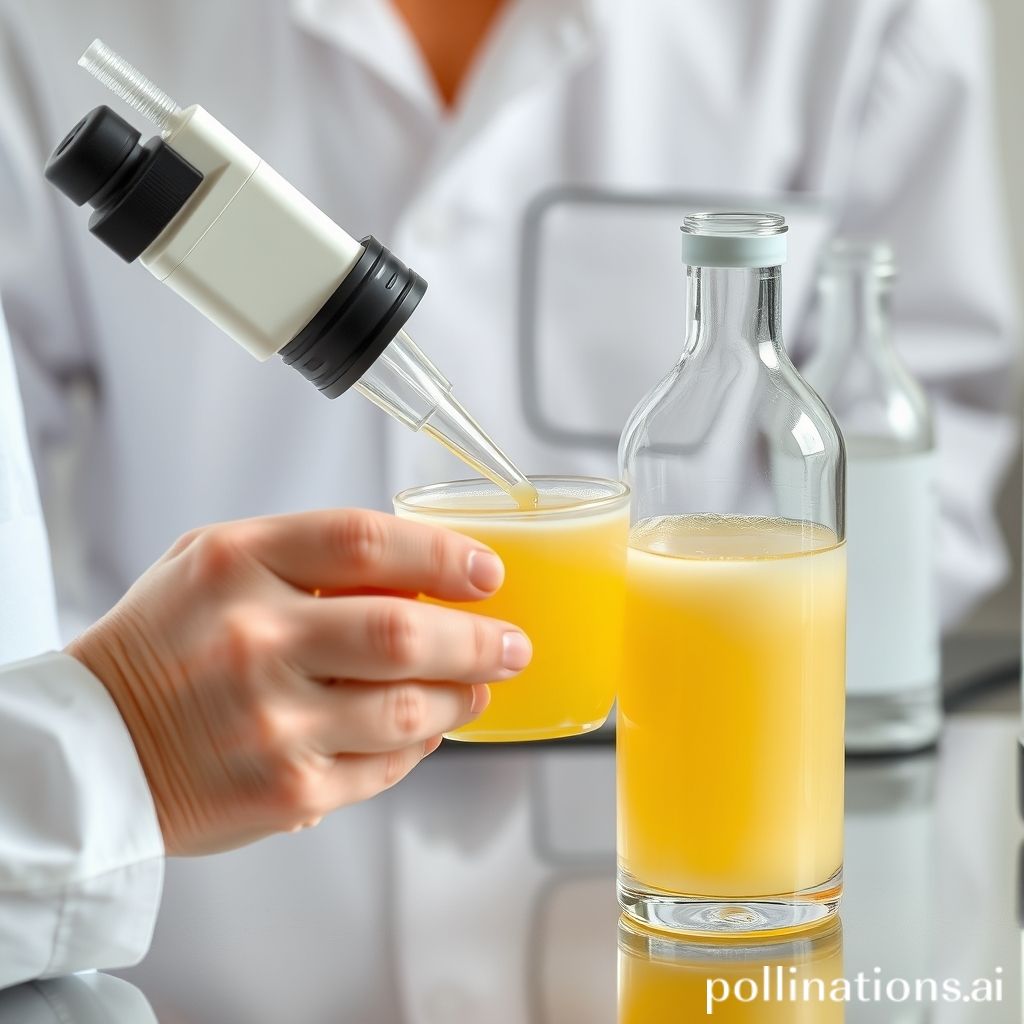Is Apple Juice Pure? Exploring Its Composition and Substances
Is apple juice a pure substance? This is a question that many people are asking. They want to know if apple juice is considered a pure substance, or if it contains other substances or additives.
In order to answer this question, we first need to understand what a pure substance is and what characteristics it has. Once we have a clear definition, we can then examine the composition of apple juice to see if it meets the criteria. This includes looking at the natural components of apple juice, such as water, sugar, and vitamins, as well as any possible additives that may be present in commercial apple juice, such as preservatives or flavorings. By Appraising the purity of apple juice and comparing it to other beverages, we can determine if it can be classified as a pure substance or not.

Table of Contents
Understanding Pure Substances
In order to determine whether apple juice is a pure substance, it is important to understand the definition and characteristics of pure substances and explore some examples.
1. Definition and Characteristics of Pure Substances
A pure substance is a type of matter that has a definite composition and distinct properties. It consists of only one type of atom, molecule, or compound. Pure substances cannot be separated into other substances by physical means.
Pure substances have the following characteristics:
- Definite Composition: Pure substances have a fixed ratio of elements or compounds that make them up.
- Homogeneity: Pure substances are uniform throughout, meaning they have the same properties and composition in every part.
- Distinct Properties: Pure substances have unique physical and chemical properties that differentiate them from other substances.
2. Examples of Pure Substances
There are various examples of pure substances:
| Type of Pure Substance | Example |
|---|---|
| Element | Gold (Au) |
| Compound | Water (H2O) |
| Compound | Carbon Dioxide (CO2) |
In contrast, apple juice is not considered a pure substance. It is actually a mixture that contains water, sugars, acids, vitamins, minerals, and other organic compounds naturally present in apples. Therefore, apple juice does not meet the criteria of a pure substance as it consists of multiple components with different properties and concentrations.
Grasping the concept of pure substances helps clarify that Meanwhile apple juice is a delicious and nutritious beverage, it is not classified as a pure substance due to its composition.
Expert Tips: Learn the definition of pure substances and their characteristics. Understand why apple juice is not considered a pure substance.Composition of Apple Juice
1. Natural Components of Apple Juice:
Apple juice is mainly composed of natural components, including:
- Water: The majority of apple juice is made up of water.
- Sugar: Apple juice contains natural sugars, such as fructose and glucose, which give it a sweet taste.
- Vitamins: Apple juice is a good source of vitamins, including vitamin C and various B vitamins.
2. Possible Additives in Commercial Apple Juice:
In addition to the natural components, commercial apple juice may contain certain additives for various purposes:
| Additives | Purpose |
|---|---|
| Preservatives: | Preservatives like sodium benzoate or potassium sorbate are sometimes added to extend the shelf life of apple juice and prevent spoilage. |
| Flavorings: | Some commercial apple juices may include natural or artificial flavorings to enhance the taste or replicate specific apple varieties. |
It’s important to note that the presence of additives in commercial apple juice can vary among brands and products. When purchasing apple juice, reading the product label can provide information about the specific ingredients used.
Disclaimer: This article aims to provide general information and should not be considered as professional advice. It is recommended to consult with experts or refer to reliable sources for specific inquiries.
Is Apple Juice A Pure Substance?
Examining the Purity of Apple Juice
In the realm of determining whether apple juice is pure, there are several testing methods that can be used. These methods help identify any potential impurities in the juice and provide valuable information about its composition.
1. Methods for Testing Purity
There are various techniques used to analyze the purity of apple juice, including:
- Chromatography: This method separates the different components of apple juice based on their molecular properties, allowing for the identification of impurities.
- Spectroscopy: Spectroscopy uses light absorption or emission properties to determine the presence of specific substances in apple juice.
- Density Measurement: Measuring the density of apple juice can indicate the presence of added sugars or dilution with water.
- pH Testing: pH levels can provide insights into the acidity or alkalinity of apple juice, helping to identify any potential adulterants.
2. Potential Impurities in Apple Juice
Whilst apple juice is generally considered a pure substance, there may be potential impurities that can affect its purity. These impurities include:
- Additives: Some apple juices may contain additives such as preservatives, sweeteners, or flavor enhancers, which can alter the composition of the juice.
- Pesticide Residues: The apples used to make the juice may have been treated with pesticides, and traces of these chemicals can be present in the final product.
- Contaminants: During processing or packaging, apple juice may come into contact with contaminants like bacteria, mold, or foreign particles, which can affect its purity.
It is important to note that the presence of these impurities does not necessarily mean that apple juice is unsafe or unhealthy to consume. Despite this, individuals with specific dietary restrictions or allergies should carefully read product labels to ensure the absence of any unwanted substances.
By Evaluating the purity of apple juice through various testing methods and understanding potential impurities, consumers can make informed choices about the products they consume.

Is Apple Juice a Pure Substance?
Deciphering the Purity of Apple Juice
When Deciphering the purity of apple juice, several factors come into play. Understanding these factors can help us determine whether apple juice can be considered a pure substance or if it contains other substances or additives.
1. Factors Affecting the Purity of Apple Juice
The purity of apple juice can be influenced by various factors, including:
- Source of Apples: The quality and purity of the apples used to make the juice play a crucial role in Deciphering the overall purity of the juice. Organic apples that are free from pesticides and other chemicals may contribute to a purer juice.
- Processing Methods: The techniques used during the juicing and processing of apples can impact the purity of the final product. Minimal processing methods that involve minimal heat and chemical intervention are more likely to result in a purer juice.
- Additives and Preservatives: Some apple juices may contain additives or preservatives to enhance flavor, extend shelf life, or improve appearance. These additional substances may affect the purity of the juice.
2. Comparison with Other Beverages
When comparing apple juice with other beverages, it is important to consider the differences in their composition and processing. Whilst apple juice may contain natural sugars and other compounds found in apples, it generally does not undergo extensive processing like carbonated beverages or artificially flavored drinks.
An HTML table can provide a clear overview of the comparison:
| Criteria | Apple Juice | Carbonated Beverages | Artificially Flavored Drinks |
|---|---|---|---|
| Purity | May vary depending on factors mentioned above. | May contain artificial colors, flavors, and preservatives. | May contain artificial colors, flavors, and preservatives. |
| Processing | Minimal processing, often made from fresh apples. | Extensive processing, carbonation, and artificial sweeteners. | Extensive processing, artificial flavors, and sweeteners. |
The Role of Additives in Apple Juice
1. Common Additives in Commercial Apple Juice
Touching on commercial apple juice, it’s important to know that it may not always be pure. Many manufacturers add certain substances to enhance the taste, color, and shelf life of the juice. These substances can include:
- Sugar: Some apple juices may have added sugar to make them sweeter.
- Acidity Regulators: Citric acid or ascorbic acid may be added to control the acidity levels and make the juice last longer.
- Preservatives: Sodium benzoate or potassium sorbate are commonly used to prevent spoilage and increase the shelf life of the juice.
- Flavor Enhancers: Artificial or natural flavors may be added to improve the taste of the juice.
2. Effects of Additives on the Purity of Apple Juice
During these additives serve specific purposes, they can affect the purity of apple juice. Adding sugar, for example, changes the natural composition of the juice and may increase its calorie content. Additionally, preservatives and flavor enhancers, whether artificial or natural, introduce extra substances into the juice, which could impact its overall purity.
It’s important to note that not all apple juices contain these additives, as manufacturing processes and labeling requirements can vary. To ensure you’re buying pure apple juice, it’s advisable to carefully read product labels and choose juices with minimal or no additives.
Conclusion
After considering the key points discussed, it can be determined that apple juice is not a pure substance. It contains various substances and additives, such as natural sugars, vitamins, and preservatives.
In the course of apple juice may undergo filtration and processing to remove impurities, it still contains a mixture of different components. Therefore, it cannot be classified as a pure substance. Nonetheless, apple juice remains a popular and refreshing beverage enjoyed by many.
FAQ: Frequently Asked Questions About Apple Juice
FAQ 1: Is apple juice made only from apples?
Yes, apple juice is made solely from apples. It is produced by extracting the juice from fresh apples through a process that involves crushing, filtering, and pasteurizing the fruit.
FAQ 2: Can apple juice contain artificial sweeteners?
No, pure apple juice does not contain any artificial sweeteners. It is naturally sweet due to the sugars present in the apples. Notwithstanding, some commercially available apple juices may have added sweeteners or artificial flavors, so it’s important to read the labels carefully.
FAQ 3: How can I identify pure apple juice?
To identify pure apple juice, check the ingredient list on the packaging. Pure apple juice should only contain apples and perhaps vitamin C as a preservative. Avoid products that contain added sugars, artificial flavors, or other additives.
FAQ 4: Are all commercially available apple juices pure?
Not all commercially available apple juices are pure. Some brands may add sweeteners, preservatives, or other additives to enhance the taste or extend the shelf life of the product. Always read the labels and look for products that state “100% apple juice” or “pure apple juice” to ensure you are getting a product without any added ingredients.
FAQ 5: Does the purity of apple juice affect its nutritional value?
The purity of apple juice can affect its nutritional value. Pure apple juice, without any added sugars or artificial ingredients, retains the natural vitamins, minerals, and antioxidants present in the apples. Notwithstanding, apple juice with added sweeteners or other additives may have a higher calorie content and lower nutritional value. It’s best to choose pure apple juice for maximum nutritional benefits.
Read Similar Post:
1. From Recipes to Beverages: Can Apple Juice Replace Apple Cider?
2. Can Apple Cider Vinegar & Cranberry Juice Aid Weight Loss? Find Out Now!

